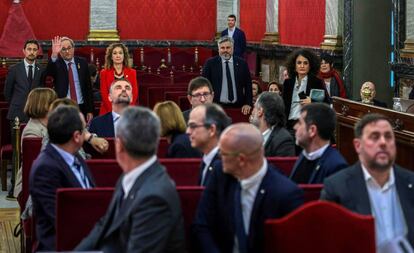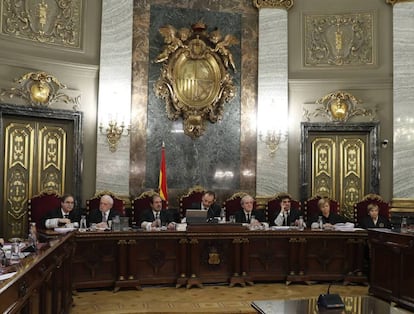Impassioned opening arguments at Catalan separatists’ trial in Madrid
Technical and political matters came together on day one of the most momentous case ever heard by the Supreme Court since the advent of democracy

The trial of Catalan separatist leaders that began on Tuesday morning is unlike any other seen at Spain’s Supreme Court. Never has so much international attention been drawn to a Spanish court case, nor has so much been at stake at the national level.
The Supreme Court has held 25 politically relevant trials since Spain embraced modern democracy in the late 1970s, but none had ever been quite like this one – not even when this same court tried the crimes committed by the GAL, the death squads that targeted Basque terrorist group ETA in the 1980s, and not when it explored illegal financing by the Socialist Party (PSOE) in the Filesa case.
Act like judges and not like saviors of the homeland
Jordi Pina, defense lawyer
On day one of the highly anticipated trial, the focus was much more on images than on arguments: Catalan premier Quim Torra walking into the courtroom wearing a yellow ribbon – the symbol of the pro-independence movement – on his lapel; the relatives waiting around in the hallways; and above all, the nine defendants who have been in pretrial custody since late 2017 sitting together inside the room, near the panel of seven justices who will try them.
Justice Manuel Marchena, who chairs the panel, gave each defense lawyer 45 minutes for their opening remarks on preliminary legal issues that need to be resolved before the trial proper begins. Although in most cases this initial hearing focuses on technical matters, on this occasion it was peppered with impassioned political statements that sought to cast doubt on the court’s legitimacy to hear the case.
“This is a general cause” against the independence movement, said Andreu Van den Eynde, the lawyer representing Catalonia’s former deputy premier Oriol Junqueras and ex-foreign affairs department chief Raül Romeva.

Van den Eynde spent much of his allotted time denouncing what he views as the violation of fundamental rights throughout the entire process. “Practically every right has been violated: the right to privacy, to the inviolability of the home, the right of assembly and demonstration, and freedom of movement. Even religious freedom, since Junqueras was not allowed to attend Mass in prison,” he said, accusing the court of “trivializing freedom” through its use of preventive custody.
The defense lawyer for former regional department chiefs Jordi Turull and Josep Rull, and for Jordi Sànchez, the ex-president of the civil society group ANC, also focused on this alleged violation of fundamental rights. The strategy is aimed at preparing the ground for an appeal that defense attorneys plan to file with the European Court of Human Rights in the event of a guilty verdict by the Spanish court.
“Act like judges and not like saviors of the homeland,” said Jordi Pina, the lawyer for Turull, Rull and Sànchez, in his opening remarks to the bench.
English version by Susana Urra.
Tu suscripción se está usando en otro dispositivo
¿Quieres añadir otro usuario a tu suscripción?
Si continúas leyendo en este dispositivo, no se podrá leer en el otro.
FlechaTu suscripción se está usando en otro dispositivo y solo puedes acceder a EL PAÍS desde un dispositivo a la vez.
Si quieres compartir tu cuenta, cambia tu suscripción a la modalidad Premium, así podrás añadir otro usuario. Cada uno accederá con su propia cuenta de email, lo que os permitirá personalizar vuestra experiencia en EL PAÍS.
¿Tienes una suscripción de empresa? Accede aquí para contratar más cuentas.
En el caso de no saber quién está usando tu cuenta, te recomendamos cambiar tu contraseña aquí.
Si decides continuar compartiendo tu cuenta, este mensaje se mostrará en tu dispositivo y en el de la otra persona que está usando tu cuenta de forma indefinida, afectando a tu experiencia de lectura. Puedes consultar aquí los términos y condiciones de la suscripción digital.









































